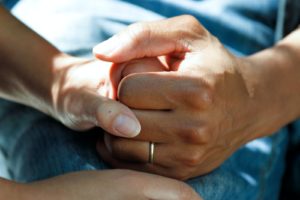
When you are diagnosed with a condition which is likely to shorten your life, you may find yourself confused, shocked, scared or even relieved, because you thought something was wrong.
You may be flooded with information at the hospital, by the Christie, a Macmillan nurse or your GP.
Amongst all the information, there is much to absorb. You may be asked to think about the future – whether you would like to talk to friends and family about what you would like to happen to you- about resuscitaion, living wills, powers of attorney etc. This is generally not meant to scare or worry but more allow you to “get your house in order”. This does not imply you are about to die! We often give this information to people with lung, kidney or heart disease- as well as cancers.
A very useful document and part of advanced care planning is for you to print this document My Care My Way which allows you and your family to record your wishes. Once completed, please hand this in to the surgery so we can keep a copy of it in your records. Keep the original for yourself so that those looking after you are aware of your wishes too. Please remember to take this with you when you go to the hospital or any clinic appointments so that others know your wishes too. Here is information about an advanced statement, a living will or advanced decision to refuse treatment and lasting power of attorney It may also be useful to review your Will if you have one in place too and also if you or your loved one has registered for organ donation. This may also be an opportunity for the rest of the family to register if you have not yet done so. It is really easy to do so!
There are many resources available:
NHS Choices provides an excellent web-based resource that you may wish to try.
Clinical Knowledge Summaries provides information and the evidence base on general issues as well as specific issues relating to pain, constipation, cough, shortness of breath (dyspnoea), nausea and vomiting, oral issues, secretions and malignant skin ulcers for end of life care. It is designed for clinicians but also available for patients and their carers to look at too. There is also a sepcific section on how best to manage end-stage dementia and end of life care in children as well as supporting carers.
Macmillan have a wide variety of leaflets, contacts and advice. You may be referred to a macmillan nurse or the district nurses through the hospital or in the community. They are a wonderful resource – providing information and support to you and your family on understanding what cancer is, diagnosing, organising, treating, coping and other resources related to cancer.

Hospice UK provide excellent advice on end of life care, how to plan ahead and how a hospice can help too. You may be referred to the Willow Wood Hospice in Ashton. Again, this is a fantastic resource. We have many patients who have attended the day hospice for years! there are activities, support of families and of course, the care and symptom control that being an inpatient can offer. We very rarely admit patients to the hospice to die, but often to help families out for a bit or have some extra help with control of pain, for instance.
The experiences of living with dying and bereavement are very varied. HealthTalkOnline have interviewed a variety of people who describe their experiences of caring for someone with a terminal illness as well as living with dying.
It is very much our aim that if you are dying, many people wish to be at home and we help that to happen if that is what you and your loved ones want too. We work on visits to the home if required, with our district nurse and Macmillan nurse colleagues, as well as Marie Curie, palliative care team and so on, to make sure that you and your loved ones feel reassured, comfortable and in control. It is possible to ensure that you are not admitted to hospital against your will, if that is what you want. We believe that helping a patient, who quite often is like an old friend to us, to have a “good death” is the most important role we could have in general practice.
It might be that you have a living will, or very specific ideas about your condition; faith, fears or misconceptions and it is important to use that you make these felt to your carers. One thing we tend to organise is a special package of medication that can be given in or out of hours by district nurses, to include relief of symptoms should they arise and you are not able to swallow, for instance. This might include nausea, pain or general issues. These medications can be administered without having to wait for doctors to come out and has been a great step forward over the last few years. Quite often, these medications are not even used but knowing they are there can be reassuring! Sometimes, we get them in place, do all the paperwork in case the patient deteriorates and then find they pick up again and we can take them away again!
We have a very well established End of Life Care register for supporting patients and families. This usually starts when your doctor thinks you may not survive for longer than a year. The doctor will then ask if you would like to be put on a palliative care / end of life care pathway also known as the Gold Standards Framework. Your doctor will discuss with you what plans you may have, who your next of kin is and whether you would be happy for your End of Life Care wishes to be shared with other services. (Your doctor will clearly explain who this may involve so that you are clear about this). The doctors at the surgery meet with others involved with end of life care regularly to discuss patients whose care has been “stepped up”. This is a good opportunity for us to share concerns, ensure that patients have received information, had social funds released, if required and any other aspects of care for individuals and their families that need to be shared between carers. This often avoids duplication of important fact finding but hopefully ensures that all carers are well informed. We encourage patients to also access their electronic health records via the NHS app which is available for Apple and Android devices so that they can also see their wishes are recorded and can be shared by yourselves.
Please check if your loved one has been SEEN by a GP either face to face or by a video call at any point during their lifetime. If the patient has access to the GP electronic health record then you can check when they were last seen. This is important to help with death certification later
DR Amir Hannan, GP
Your doctor may also discuss with you or your next of kin your dying wishes and in particular what you would like to happen if you were to collapse and become unconscious. This is important for people who are increasingly frail but may also apply to others who are nearing death and for whom cardiopulmonary resuscitation may be deemed futile. See important advice by Dr Gordon Caldwell, a retired consultant physician, describing this problem he saw regularly in hospital when these issues had not been discussed. If this is the case for you then discuss this with your doctor who can then record your wishes to have a “Do Not Attempt Cardiopulmonary Resuscitation” (DNACPR) and provide you with an important lilac coloured form which would be instantly recognisable by all staff including ambulance crews too. You can watch a video Dr Caldwell has done below
The out of hours doctors will have been informed if you are one of those folk we are more involved with, so that they can respond quickly to you should you call. They will know what medications you take and what your diagnosis is. We are increasingly finding that patients like to have access to their own GP records so they can give more information if required. In some of the local care homes and nursing homes, the staff can have access to this information, with patient and family consent. Please get in touch with the practice if you would like to know more about this service.
Whilst on the subject of planning ahead, why not register “my funeral wishes” too and get peace of mind knowing that all your requirements have been taken care of in advance. Here is a great resource explaining how to plan ahead for your care made by Compassion in Dying.

Here is an excellent blog written by the late Dr Kate Granger, a Specialist Registrar in Elderly Care Medicine and who died with cancer giving her perspective on End of Life Care, dignity, compassion and care.
We would encourage you to let us know if you have any queries about any of the issues mentioned above but also invite you to check out the links to further sources
Click here to learn what happens when someone dies






